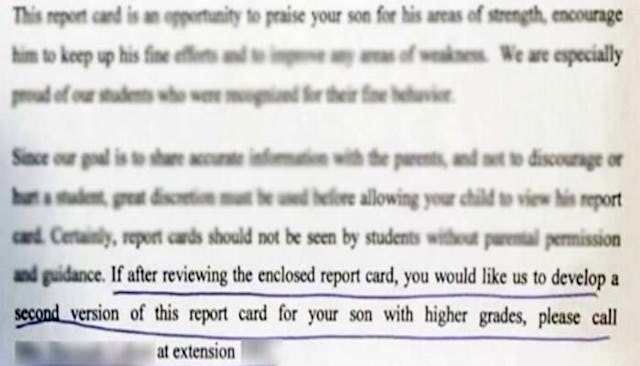Letter Sent To Parents Offers Fake Report Card Option For Kids

School offers parents a second report card with better grades on it to show their kids
Praising a child and focusing on their strengths is fantastic, but one school may be going a little too far. A letter sent to parents from a Yeshiva (Orthodox Jewish elementary school) in Long Island, New York is making the rounds on the internet because it’s contents are a bit… absurd. The letter offers parents the chance to look over the grades then request a second report card be sent home that the child can see that reports better grades than they actually earned.
Yup. Two report cards: one based in reality, and one with a bunch of made-up letters on it so your kid won’t feel too bad. Here’s the text, obtained by The Yeshiva World:
Dear Parents,
Enclosed you will find your son’s report card for the first semester. Please not that report cards are only one indication of how your son is doing. After you review is carefully, feel free to contact your son’s Rebbe, teacher or the administration to discuss any of your concerns.
This report are is an opportunity to praise your son for his areas of strength, encourage him to keep up his fine efforts and to improve any areas of weakness, We are especially proud of our students who were recognized for their fine behavior.
Since our goal is to share accurate information with the parents, and not to discourage or hurt a student, great discretion must be used before allowing your child to view his report card, Certainly, report cards should not be seen by students without parental permission and guidance. If after reviewing the enclosed report card, you would like us to develop a second version of this report card for your son with higher grades, please call Mrs. [NAME REMOVED] extension 1xxx.
The letter obviously has good intentions, but what is the benefit of not allowing students to know how they actually performed in class? Positive reinforcement is one thing, but deceiving them into believing they performed better than they did seems a little misguided.
The real world does not work that way for most of us: we really do have to perform well to receive accolades. It’s great to encourage our kids, but shielding them from small academic failures might not exactly be the best tactic.